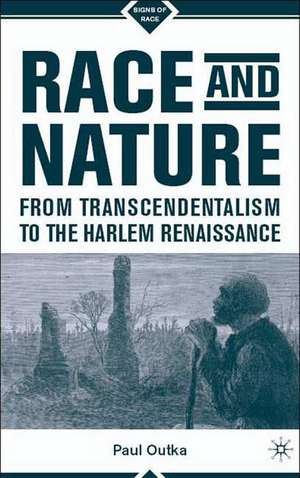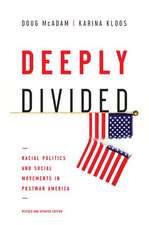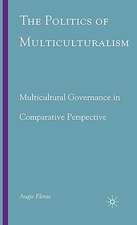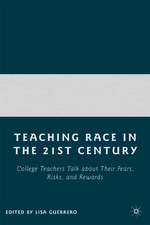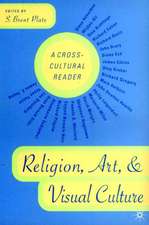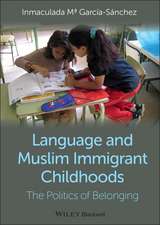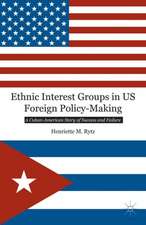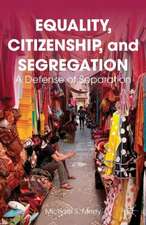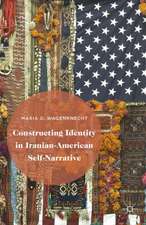Race and Nature from Transcendentalism to the Harlem Renaissance: Signs of Race
Autor P. Outkaen Limba Engleză Hardback – 29 sep 2008
| Toate formatele și edițiile | Preț | Express |
|---|---|---|
| Paperback (1) | 694.04 lei 6-8 săpt. | |
| Palgrave Macmillan US – 15 apr 2013 | 694.04 lei 6-8 săpt. | |
| Hardback (1) | 640.06 lei 6-8 săpt. | |
| Palgrave Macmillan US – 29 sep 2008 | 640.06 lei 6-8 săpt. |
Preț: 640.06 lei
Preț vechi: 753.01 lei
-15% Nou
Puncte Express: 960
Preț estimativ în valută:
122.47€ • 127.87$ • 101.36£
122.47€ • 127.87$ • 101.36£
Carte tipărită la comandă
Livrare economică 04-18 aprilie
Preluare comenzi: 021 569.72.76
Specificații
ISBN-13: 9780230602960
ISBN-10: 0230602967
Pagini: 266
Ilustrații: XIII, 266 p.
Dimensiuni: 140 x 216 x 20 mm
Greutate: 0.41 kg
Ediția:2008
Editura: Palgrave Macmillan US
Colecția Palgrave Macmillan
Seria Signs of Race
Locul publicării:New York, United States
ISBN-10: 0230602967
Pagini: 266
Ilustrații: XIII, 266 p.
Dimensiuni: 140 x 216 x 20 mm
Greutate: 0.41 kg
Ediția:2008
Editura: Palgrave Macmillan US
Colecția Palgrave Macmillan
Seria Signs of Race
Locul publicării:New York, United States
Cuprins
The Sublime and the Traumatic The Colonial Pastoral, Abolition, and the Transcendentalist Sublime 'Behold a man transformed into a brute': Slavery and Antebellum Nature Trauma, Postbellum Nostalgia, and the Lost Pastoral Trauma and Metamorphosis in Charles Chesnutt's Conjure Tales Strange Fruit White Flight Migrations
Recenzii
"Exciting, often brilliant readings...Outka has made a major contribution to the fields of ecocriticism and race studies, revealing much of their mutual interest." - Interdisciplinary Studies in Literature and Environment
"At each stopping point, the book sparkles with fascinating insights...powerfully provocative." - Journal of American Ethnic History
"Outka's book sets a new precedent for important work to be done in articulating ecocriticism with African-American literature and other related fields." - Journal of Ecocriticism
"The most theoretically ambitious and historically inclusive coordinated assessment to date of the traditional ecocritical canon in relation to African-American writing." - Lawrence Buell, Powell M. Cabot Professor of American Literature, Harvard University, USA and author of The Environmental Imagination and Writing for an Endangered World
"This book has the potential to change ecocritical scholarship, and perhaps even American environmental thinking, for the better. It promises to wake us up to the ways race and nature are deeply entangled in American history and ideology. When we can see the majestic mountain, says Outka, as well as the 'strange fruit' hanging from the tree when we can see that white relationship to nature has its roots in the Romantic sublime, while African American relationship to nature has it roots in the traumatic racism of slavery and its aftermath, then we can begin, as scholars andenvironmentalists, to embrace the true complexity of the American landscape." - Gretchen Legler, Professor, Department of Humanities, BFA Program in Creative Writing, University of Maine at Farmington, USA
"A very important book. It will significantly advance the discussion of environmental justice. I strongly recommend it." - James H. Cone, Charles Augustus Briggs Distinguished Professor of Systematic Theology, Union Theological Seminary, USA
"At each stopping point, the book sparkles with fascinating insights...powerfully provocative." - Journal of American Ethnic History
"Outka's book sets a new precedent for important work to be done in articulating ecocriticism with African-American literature and other related fields." - Journal of Ecocriticism
"The most theoretically ambitious and historically inclusive coordinated assessment to date of the traditional ecocritical canon in relation to African-American writing." - Lawrence Buell, Powell M. Cabot Professor of American Literature, Harvard University, USA and author of The Environmental Imagination and Writing for an Endangered World
"This book has the potential to change ecocritical scholarship, and perhaps even American environmental thinking, for the better. It promises to wake us up to the ways race and nature are deeply entangled in American history and ideology. When we can see the majestic mountain, says Outka, as well as the 'strange fruit' hanging from the tree when we can see that white relationship to nature has its roots in the Romantic sublime, while African American relationship to nature has it roots in the traumatic racism of slavery and its aftermath, then we can begin, as scholars andenvironmentalists, to embrace the true complexity of the American landscape." - Gretchen Legler, Professor, Department of Humanities, BFA Program in Creative Writing, University of Maine at Farmington, USA
"A very important book. It will significantly advance the discussion of environmental justice. I strongly recommend it." - James H. Cone, Charles Augustus Briggs Distinguished Professor of Systematic Theology, Union Theological Seminary, USA
Notă biografică
PAUL OUTKA is Assistant Professor of English, Florida State University. He has published essays on nineteenth- and twentieth-century U.S. literature and culture with a particular focus on poetry, race, and the natural environment.
